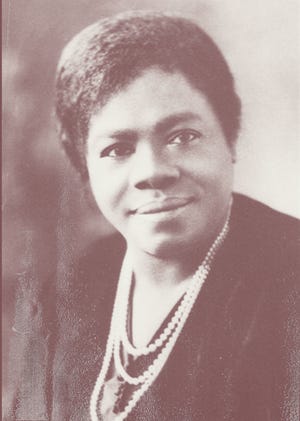A statue of inspirational civil rights pioneer Mary McLeod Bethune has supplanted that of a Confederate general within the U.S. Capitol.
The 11-foot-tall statue, unveiled in a Wednesday ceremony, was sculpted by Nilda Comas from an 11.5-ton marble block hailing from Michelangelo’s cave in Tuscany. Her likeness holds a black rose made from Spanish black marble.
Bethune’s statue replaces a nearly 100-year-old bronze sculpture of Confederate General Edmund Kirby Smith removed on Sept. 4, 2021 and placed in temporary storage at the Museum of Florida History in Tallahassee, Florida.
“Today, we are rewriting the history we want to share with our future generations,” said Rep. Frederica Wilson, D-Fla., one of several speakers during the unveiling ceremony. “We are replacing a remnant of hatred and division with the symbol of hope and inspiration … in her rightful place among our nation’s giants of history.”
Women of the Century:Mary McLeod Bethune and Janet Reno among influential women on list from Florida
What’s everyone talking about? Sign up for our trending newsletter to get the latest news of the day
Born into a family of South Carolina slaves, Mary McLeod Bethune grew up to begin her own school for Black girls in 1904 “with six students, one of which was her son Albert, with $1.50,” said Lawrence M. Drake II, interim president of Bethune-Cookman University in Daytona Beach, Florida.
That school would eventually become Bethune-Cookman College in 1929 and today has “thousands of graduates around the world who are living examples of our motto: Enter to learn, depart to serve,” Drake said.
Bethune also championed women’s rights and the right to vote. Named to President Franklin D. Roosevelt’s unofficial “Black Cabinet,” she fought for anti-lynching legislation and other initiatives including the banning of poll taxes. Roosevelt also named her director of the Negro Affairs of the National Youth Administration, making her the first African American woman to head a federal agency.
In all, Bethune advised five presidents and she was also one of only eight women – and the only Black woman – among the U.S. delegation that created the United Nations charter. “Dr. Bethune did her part to form that more perfect union we that we love to talk about and to establish justice,” said Rep. Val Demings, D-Fla.
More on Bethune from the USA TODAY Network:Statue of trailblazing educator and civil rights activist Bethune unveiled in U.S. Capitol
House Majority Whip James Clyburn, D-S.C., noted that Bethune’s statue is the first representing a Black person, male or female, in the state collection within Statuary Hall in the U.S. Capitol. It’s made up of 100 statues, two from each state. Four other Black people represented in other parts of the Capitol: Martin Luther King Jr., Frederick Douglass, Sojourner Truth and Rosa Parks.
He also read from Bethune’s last will and testament: “I leave you love and I leave you hope. I leave you the challenge of developing confidence in one another. I leave you with a thirst for education. I leave you a respect for the use of power. I leave you faith, I leave you racial dignity. I leave you a desire to live harmoniously with your fellow men. I leave you finally a responsibility to our young people.”
Contributing: Jim Abbott and Eileen Zaffiro-Kean, The Daytona Beach News-Journal; Annie Blanks, Pensacola News Journal.
Follow Mike Snider on Twitter: @mikesnider.


